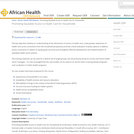
This lesson is designed to help students learn to access health care on their own.
- Subject:
- Health, Medicine and Nursing
- Material Type:
- Lesson
- Lesson Plan
- Author:
- Sexuality Education Open Learning
- Date Added:
- 08/04/2022

This lesson is designed to help students learn to access health care on their own.

This lesson is designed to help students learn to access health care on their own.

This second lesson enables students to apply what they know about human reproduction via PIV sex (Lesson 1 of this series) to other means of reproduction. They will not only learn the steps in how insemination and IVF work to create a pregnancy, but they will also learn that people other than parents can provide the genetic material (eggs, sperm, and embryos) and give birth to a child for someone else (surrogates). Students will be working in small groups to help one another understand the concepts and to practice using the inclusive language that the educator modeled in the first lesson.

The key objectives develop an understanding of the dimensions of access to health care; create greater awareness of health care access constraints from the household perspective; promote critical evaluation of policy options to address access constraints in relation to equity goals; promote and strengthen effective development and implementation of equitable health sector policies. The training materials can be used for a diverse set of target groups, but are primarily aimed at current and future health sector managers. It is also envisaged that the case studies can be used on an ad-hoc basis in post-graduate programs such as Masters in Public Health programs. Six case studies have been prepared for this course: Experiences of households in Sri Lanka, Availability of health services and resource allocation, Affordability of drugs in the context of the World Trade Organisation (WTO) Tax. Insurance funding for health systems, Health service acceptability issues, Access board game.